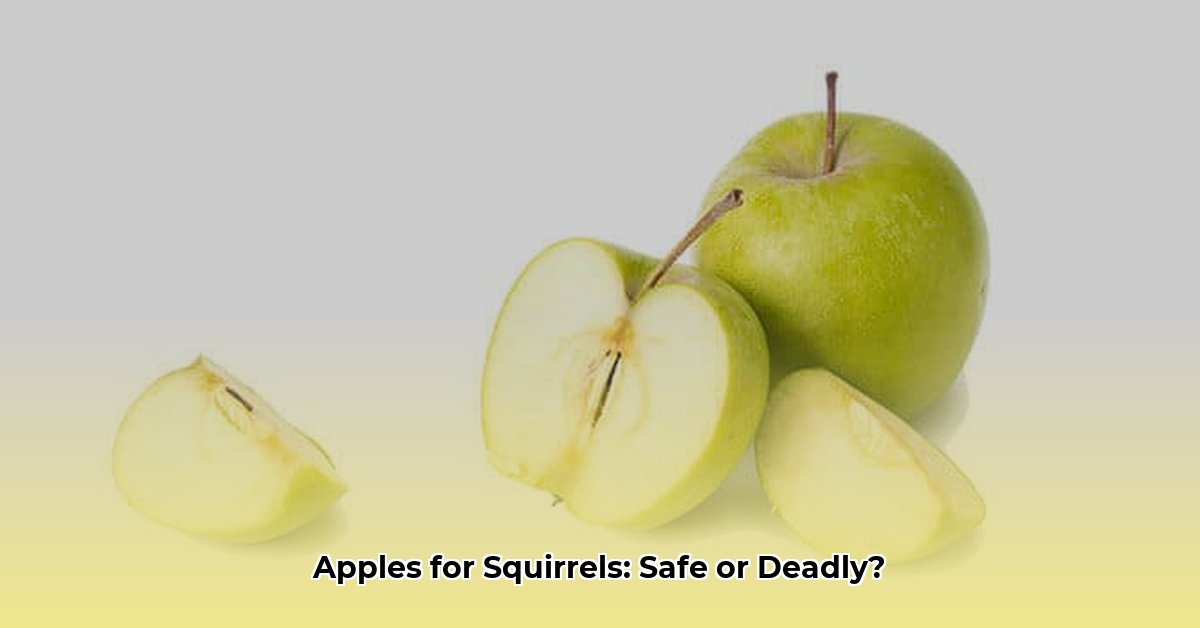So, you’ve spotted a squirrel eyeing your apple tree? While they can technically nibble on apples, the real question is should they? The seeds and core of an apple contain a compound that releases cyanide, posing a risk to these bushy-tailed critters. Let’s explore the facts about apple safety for squirrels and discover healthier ways to support our furry neighbors.
The Apple Core Problem: A Seed of Danger
Apples themselves aren’t entirely off-limits, but the seeds and core are a definite no-no for squirrels. They contain amygdalin, which releases cyanide when digested. While a tiny amount might not cause immediate harm, repeated exposure or consuming many seeds at once can lead to cyanide poisoning. Symptoms may include nausea, dizziness, vomiting, and breathing difficulties.
A diagram of an apple, clearly labeling the seeds and core.
Apples: An Occasional Treat, Not a Staple
The fleshy part of the apple, without the seeds or core, can be offered as a very occasional treat, but it shouldn’t be a regular part of a squirrel’s diet. Apples are high in sugar, which can disrupt their digestive system and lead to long-term health issues like obesity and dental problems. Overconsumption of sugary foods may also discourage natural foraging behavior.
What Should Squirrels Be Eating?
Squirrels thrive on a diverse diet of natural foods. Instead of apples, opt for healthier alternatives that provide the nutrients they need:
| Food | Notes |
|---|---|
| Acorns | A natural staple, rich in healthy fats and other nutrients. |
| Walnuts | An excellent source of fats and protein. |
| Hickory Nuts | Provide essential nutrients and encourage natural foraging. |
| Sunflower Seeds (shelled) | Offer in moderation due to high fat content. |
| Pumpkin Seeds (shelled) | A good source of minerals and vitamins. |
| Leafy Greens | Provide vitamins and minerals. |
| Carrots | Offer in small pieces; good source of fiber and vitamins. |
Image of a squirrel eating nuts and seeds.
Protecting Your Apple Trees – Humanely
If you’re trying to protect your apple trees, there are several humane and effective strategies:
- Netting: Drape netting over your trees to create a physical barrier.
- Tree guards: Install metal guards around the trunk to prevent squirrels from climbing.
- Repellents: Some natural repellents deter squirrels with scent. Always opt for those safe for pets and wildlife. Check with your local garden center for recommendations.
- Diversion: Set up a squirrel feeder away from your apple trees with their preferred foods, like nuts and seeds.
The Ethics of Feeding Wildlife
It’s crucial to remember that feeding wildlife, including squirrels, can have unintended consequences. Regular feeding can create dependence, disrupt natural foraging behaviors, and potentially lead to overpopulation and the spread of disease. Ongoing research suggests that observing squirrels without interference is often the most responsible approach. Minimal, occasional interaction, such as offering a small piece of a natural food source, may not be detrimental, but the scientific community is still exploring the complex relationship between humans and wildlife. Avoid feeding squirrels altogether if local wildlife organizations advise against it.
A Final Word on Apples and Squirrels
While offering a small, occasional sliver of apple (flesh only!) might seem harmless, it’s best to stick to providing natural food sources or, even better, letting squirrels forage on their own. By understanding their needs and acting responsibly, we can help these fascinating creatures thrive in their natural environment.
- Food Making Kits Bring Easy, Fun Homemade Dishes to Your Kitchen - February 5, 2026
- Cooking Kits Make Mastering New Recipes Fun for Everyone - February 4, 2026
- Leak-Proof Glass Food Containers with Locking Lids Keep Food Fresh - February 3, 2026










